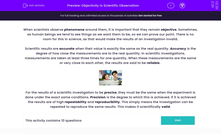When scientists observe phenomena around them, it is important that they remain objective. This means looking at something without favouritism or bias. Sometimes, as human beings we tend to see things as we want them to be, so we can prove our point. There is no room for this in science, as that would make the results of an investigation invalid.
Accuracy and reliability
Scientific results are accurate when their value is exactly the same as the real quantity. Accuracy is the degree of how close the measurements are to the real quantity. In other words, accurate data is correct data. In scientific investigations, measurements are taken at least three times for one quantity. When these measurements are the same or very close to each other, the results are said to be reliable.

Precision and repeatability
For the results of a scientific investigation to be precise, they must be the same when the experiment is done under exactly the same conditions. Precision is the degree to which this is achieved. If it is achieved, the results are of high repeatability and reproducibility. This simply means the investigation can be repeated to reproduce the same results. This makes it scientifically valid.
Let's have a go.







